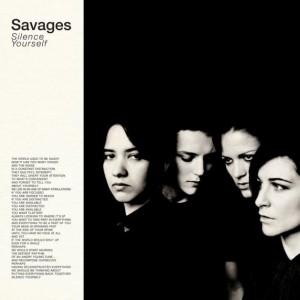Silence Yourself
 “THE WORLD — USED TO BE SILENT / NOW IT HAS TOO MANY VOICES” declares the cover of Savages’ debut album Silence Yourself. Taken from a string of mini-manifestos anthologised online, this deploration of the bedlam of noise permeating modern life sets a precedent for Silence Yourself, which, true to its title, demands the full and unadulterated attention of its audience.
“THE WORLD — USED TO BE SILENT / NOW IT HAS TOO MANY VOICES” declares the cover of Savages’ debut album Silence Yourself. Taken from a string of mini-manifestos anthologised online, this deploration of the bedlam of noise permeating modern life sets a precedent for Silence Yourself, which, true to its title, demands the full and unadulterated attention of its audience.
Somewhere between the clangour of tom-heavy percussion and the strident high-end blaring from Gemma Thompson’s electric guitar, Silence Yourself immediately undertakes to fill the very silence it creates, forging a soundscape as clamorous and exclamatory as their all-capitals manifesto. The coarse, organic texture of Savages’ sound has had a flurry of buzzwords such as “post-punk apocalypse” and “Siouxie-esque” circulating the internet since the album was made available for streaming a week in advance of its release date. There’s a kind of poignant irony in the fact that for all the scepticism towards the hyper-technical (“WE BELIEVE THE — USE OF PHONES TO FILM AND TAKE PICTURES DURING A GIG PREVENTS ALL OF US FROM TOTALLY IMMERSING OURSELVES”), the surge in excitement surrounding Savages’ debut has operated largely in cyberspace; a powerful testament, perhaps, to the perennial postmodern impasse of being at once alienated by and indebted to technology.
This is just one of many contradictions at the heart of Savages’ campaign, along with their demand for simultaneous silence and noise, but for all their paradoxes, the group hold down a strong thread of musical consistency in Silence Yourself. Each instalment of this eleven-track LP is packed with an unfaltering energy, which peaks in the uproarious, authentic punk-time signature of ‘Hit Me’. The blistering bassline that launches the album into opener ‘Shut Up’ underpins a nifty display of guitar work which is sustained across the entirety of the LP, all held in exquisite tension by the immaculate production teamwork of Johnny Hostile and Rodaidh McDonald.
The raucous aggression of this sound resonates brilliantly with the album’s impulse for social satire, from the scathing observation of “so many skinny pretty girls” in ‘City’s Full’ to the yelping anaphora of “Husbands! Husbands! Husbands!” in – naturally – ‘Husbands’. The only real deviation from this aesthetic is to be found in final track ‘Marshal Dear’ which brings the LP into land with an infusion of melodic piano tones, and a shock saxophone solo, consummating the record’s sultry attitude in an irresistible, rough-hewn outburst of jazz.
Despite a wealth of acclaim for their debut effort, the only criticism that can really be levelled against Savages is that they potentially lack any real innovative capacity, instead regurgitating the sounds of the likes of Bauhaus and Joy Division. But make no mistake, despite the obvious stylistic allusiveness, Savages belong in the here-and-now, re-approximating the timbre of post-punk to the 21st century, where the atmosphere is even more humid with the buzz of smartphones and social media. And, as self-righteous as their endless manifestos can be, the songs on Silence Yourself speak out Savages’ bullheaded agenda for themselves, ventriloquised compellingly by Jehnny Beth’s hoarse, yowling vocals, fortified by copious amounts of reverb. Silence Yourself won’t revolutionise modern music, but it is a highly sophisticated, polished product that deserves your deepest, sincerest attention.
Similar To: Joy Division, Patti Smith
MP3: ‘Shut Up’, ‘Hit Me’, ‘Marshal Dear’
Comments